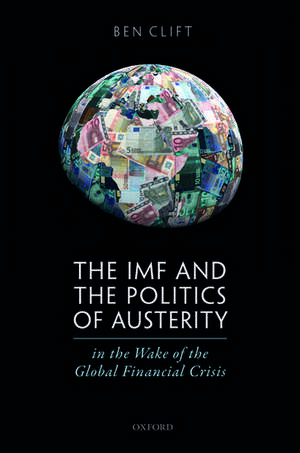The IMF and the Politics of Austerity in the Wake of the Global Financial Crisis
Autor Ben Cliften Limba Engleză Hardback – 22 feb 2018
Preț: 564.94 lei
Preț vechi: 766.25 lei
-26% Nou
108.20€ • 111.47$ • 90.64£
Carte tipărită la comandă
Livrare economică 12-18 februarie
Specificații
ISBN-10: 0198813082
Pagini: 298
Dimensiuni: 164 x 241 x 24 mm
Greutate: 0.61 kg
Editura: OUP OXFORD
Colecția OUP Oxford
Locul publicării:Oxford, United Kingdom
Descriere
This book explores the IMF's role within the politics of austerity by providing a path-breaking comprehensive analysis of how the IMF approach to fiscal policy has evolved since 2008, and how the IMF worked to alter advanced economy policy responses to the global financial crisis (GFC) and the Eurozone crisis. It updates and refines our understanding of how the IMF seeks to wield ideational power by analysing the Fund's post-crash their ability to influence what constitutes legitimate knowledge, and their ability fix meanings attached to economic policies within the social process of constructing economic orthodoxy.This book is interested in the politics of economic ideas, focused on the assumptive foundations of different approaches to economic policy, and how the interpretive framework through which authoritative voices evaluate economic policy is an important site of power in world politics. After establishing the internal conditions of possibility for new fiscal policy thinking to emerge and prevail, detailed case studies of IMF interactions with the UK and French governments during the Great Recession drill down into how Fund seeks to shape the policy possibilities of advanced economy policy-makers and account for the scope and limits of Fund influence. The Fund's reputation as a technocratic, scientific source of economic policy wisdom is important to for its intellectual authority. Yet, as this book demonstrates, the Fund makes normatively driven interventions in ideologically charged economic policy debates. The analysis reveals the malleability of conventional wisdoms about economic policy, and the processes of their social construction.
Recenzii
Ben Clift paints a rich picture of the IMF as it evolved during the global financial crisis. He claims, controversially, that when it came to advanced non-borrowing members the IMF pivoted back to its Keynesian roots following a long embrace of neoliberalism. The book challenges standard totalizing IMF narratives at a time when that institution is adjusting unevenly to the new environment in which it is operating.
Notă biografică
Ben Clift is Professor of Political Economy at the University of Warwick. His research interests lie at the interface of comparative and international political economy. He is author of Comparative Political Economy: States, Markets and Global Capitalism (Palgrave, 2014), French Socialism in a Global Era (Continuum, 2003), and co-editor of Economic Patriotism: Political Intervention in Open Markets (Routledge, 2012) and Where AreNational Capitalisms Now? (Palgrave 2004). He has published widely on the politics of economic ideas, the IMF, French and comparative capitalisms, the political economy of social democracy, and French and British politics in journals including British Journal of Political Science, Journal of Common Market Studies, Journal ofEuropean Public Policy, Review of International Political Economy, and New Political Economy.
